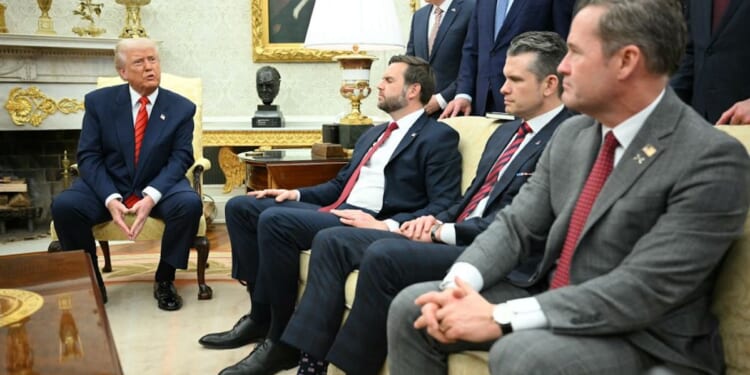On Monday, Jeffrey Goldberg, the execrable editor of The Atlantic, dropped a bombshell story. Goldberg is basically a stand-in for Barack Obama’s foreign policy team.
He broke the story that he was accidentally included in a Signal chat that was basically comprised of every top member of Team Trump in the national security sphere, ranging from the Secretary of Defense Pete Hegseth, to National Security Advisor Mike Waltz, to Vice President of the United States JD Vance, to Stephen Miller, a top adviser to President Trump.
They were all in a Signal chat discussing the upcoming military strike on the Houthis. Waltz accidentally included Goldberg in this Signal chat.
What exactly happened here? The answer is almost certainly that Waltz meant to include the U.S. Trade Representative Jamieson Greer.
Signal is an encrypted messaging service that is basically supposed to be uncrackable by outside sources. When using Signal — as I myself do — you can choose how your name appears in its identity line. You can either pick your full name or your initials.
My assumption is that Jamieson Greer opted to use his initials, “JG,” and that whoever put together the group selected Jeffrey Goldberg of The Atlantic instead.
This does not mean, as so many folks who do not like Mike Waltz surmise, that he was regularly chatting with Goldberg. It just means that Goldberg was in a list of contacts that included Greer, both of them used their initials “JG,” and he selected the wrong one.
Obviously, the biggest issue is the leak itself. How did this happen?
WATCH: The Ben Shapiro Show
President Trump was asked about this yesterday, and said, “I don’t know anything about it. I’m not a big fan of The Atlantic. To me, it’s a magazine that’s going out of business. I think it’s not much of a magazine, but I know nothing about it.” When told the chat was discussing the attack on the Houthis, Trump replied, “The Houthis? You mean the attack on the Houthis? Well, it couldn’t have been very effective because the [U.S.] attack was very effective. I can tell you that.”
When Hegseth was asked about this, he tore into The Atlantic as well: “So you’re talking about a deceitful and highly discredited so-called journalist who’s made a profession of peddling hoaxes time and time again, to include the, I don’t know, the hoaxes of ‘Russia, Russia, Russia’ or the ‘fine people on both sides’ hoax or ‘it’s suckers and losers’ hoax. This is a guy who peddles in garbage.”
I’m on board. I think The Atlantic, particularly Goldberg, is not a good representative of the journalistic institution. He was basically a stenographer for Barack Obama. But it was confirmed that the Signal chat involved all these players, and the story was real.
That raises a couple of questions. One is legal. There are people who are attempting to claim that this was somehow violative of criminal law, that this was a breach of Official Records Acts because an auto-delete function can be activated in Signal chats.
The use of terms in The Atlantic piece such as “high side” suggests that there was an entire other thread that was going on inside these sort of classified government rooms. That was preserved. So, there’s that.
Second, the president of the United States has the ability to simply declassify whatever he wants. So the idea that this is some violation of law is overstated. Is it a scandal? Sure, it’s a scandal when there’s a screwup this big. If you accidentally include a journalist in a high-ranking discussion about the precise location of a bombing, that is a major problem, of course. It is a breach of security.
But I am not willing to hear such claims from people on the Democratic side of the aisle who were perfectly fine with the Hillary Clinton email issue. This is one of the lines that the Left is hammering: “You guys, you fussed all about Hillary Clinton and her emails and keeping those on her own private server.”
First, we should recognize that what Hillary Clinton did and what happened here (inviting a journalist into a group chat) are both quite bad. Obviously, that involves high-ranking discussions of national security matters that are classified. That is a giant booboo.
As much as I despise Goldberg as a human being, I think he actually did the responsible thing in not printing, for example, operational details or blowing the operation beforehand, which he certainly could have done.
With that said, the reason that everyone is so casual about the use of classified material these days is because of the original sin of James Comey not prosecuting Hillary Clinton over her emails. That set up an entire permission structure for people to mishandle classified materials — unless you’re a Republican.
That is the way this works. If Hillary Clinton uses classified materials, and she puts them on a private server — which Comey of the FBI openly acknowledged was likely accessed by foreign sources — and no prosecution attends, how can that rule apply to anybody else?
This is why it was so ridiculous when they tried to go after Trump for the mishandling of classified documents at Mar-a-Lago at the same exact time that Joe Biden had classified documents in his garage.
This issue is largely played out, in the sense that while something can be a giant screwup, nobody takes it as a criminal-level screwup at this point. That was laid to rest in 2015 and 2016 by the operation to let Clinton off the hook back for her email scandal.
When the Left says, “We’ve now heard the end about her emails,” the reality is, “But her emails,” was the inciting event for an entire string of mishandling of classified materials on both sides of the aisle.
Some Democrats say this could have cost lives. As it stands, that is hypothetical and did not happen in reality. A giant screwup is not quite the same thing as an intentional move to endanger human life on the American side of the aisle.
It’s also worth noting that many of the same people who are very upset with this particular situation would have been perfectly happy if the war plan had been leaked by a Trump administration insider and printed on the front page of The New York Times — which happened all the time in the first Trump administration.
What is interesting is the mobilization on one side of the Republican aisle against Waltz in particular, because there are really two issues that are of note with regard to this leak.
One is the leak itself, which obviously is deeply noteworthy. And the administration should make sure nothing like this ever happens again.
But then, there is the second issue, which is what was actually said in the leak. I have noticed that the partisans of Vance are saying that the real story is the leak, while partisans of Waltz are saying that the real story is what was said in the chat.
The answer is both. Both of these things are actual real stories, and neither should be obscured.
People who are fans of the vice president are shifting the focus away from what Vance actually said in the chat, which is another fascinating aspect to this.
This is a window into the open foreign policy debates happening inside the Trump administration. Trump says we are going to reopen freedom of trade and freedom of the seas. We’re going to strike the Houthis; we’re not going to be cowards as the Biden administration was.
A consequential discussion ensues in the chat: part of the administration says we need to go punch the Houthis in the mouth, but Vance says we should not punch the Houthis in the mouth and then puts forward a pretty milquetoast delay tactic. Vance posited an open disagreement with President Trump: “I’m not sure the president is aware how inconsistent this is with his message on Europe right now.”
It isn’t. Striking the Houthis is not inconsistent with his messaging on Europe.
By the way, the argument that only 3% of U.S. trade runs through the Suez but 40% of European trade does and thus it doesn’t matter for the United States if trade moves through the Suez Canal is incredibly silly because trade is intertwined. If the price of goods drastically goes up in Europe, then the price of goods in the United States will go up as well — because we trade with Europe.
Vance’s remarks bespeak an entirely different geopolitical strategy than what the Trump administration as a whole has been promoting. When looking past the leak issue to the actual content, Waltz, Hegseth, and Miller reflect the priorities of the president of the United States.
But Vance? Not so much. When he says, “This is really about cramming it down on the Europeans, so why don’t the Europeans do it,” he knows full well that the Europeans are not capable of taking on the Houthis. He also understands how global trade works.
This really suggests that the vice president has a very different view of foreign policy from Trump’s, a view that he expressed pretty clearly before he was vice president when he said he didn’t care whether Russia took Ukraine. That is certainly a view that bespeaks of foreign policy and spheres of influence — essentially, that Russia should have its own sphere of influence in Eastern Europe, stretching all the way down into the Middle East, and that the United States should basically remove itself from the world, which may or may not mean a broader sphere of influence for the Chinese.
Vance has a very different foreign policy than the Trump foreign policy. That’s just reality.
When he makes statements that openly conflict with the President of the United States’ statements, that is another side to this story.
There are two dueling narratives, and it will be interesting to see how it shakes down inside the administration.











